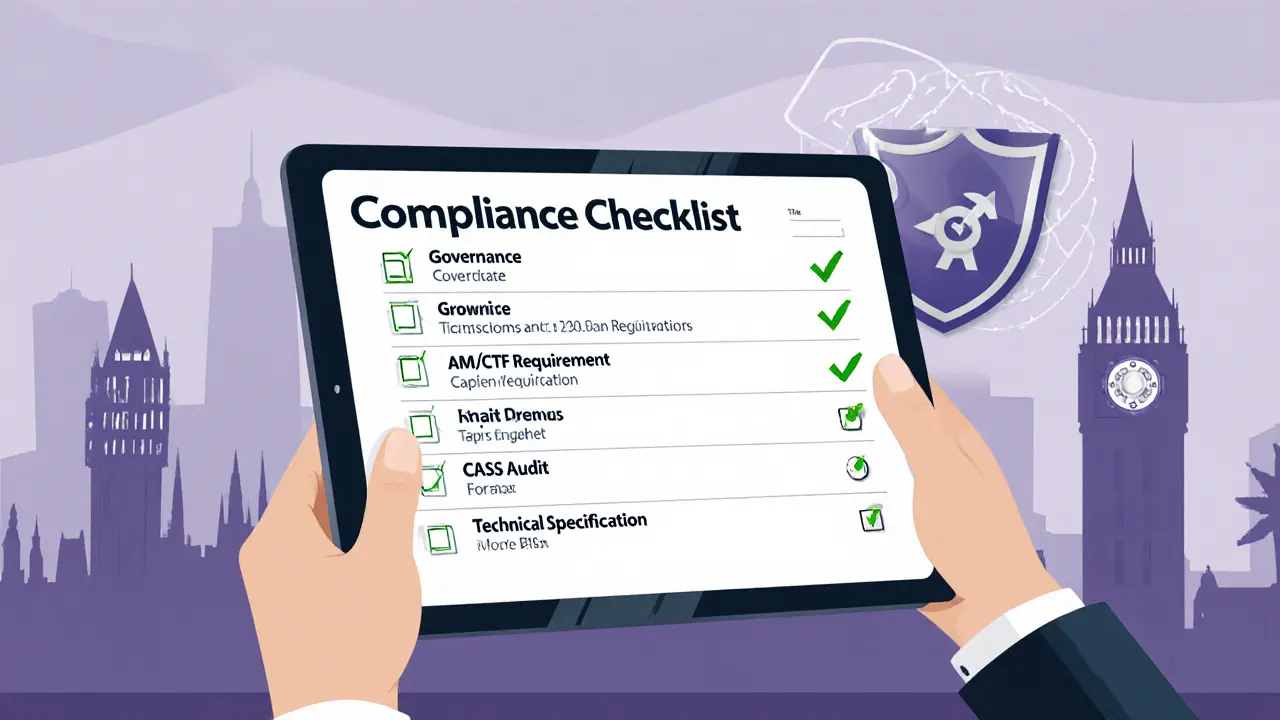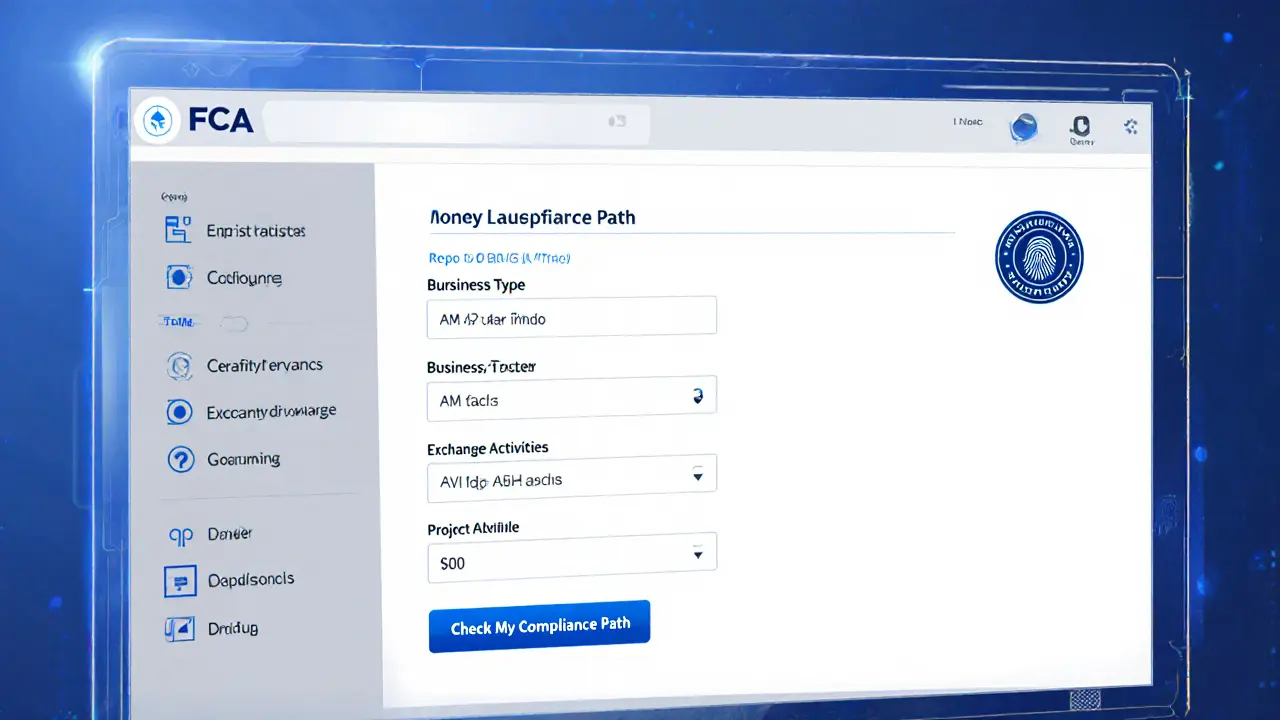UK Crypto Exchange Authorization Planner
Your Compliance Plan
All UK-based crypto exchanges must register with the FCA under the Money Laundering Regulations (MLR).
- Register with FCA before serving UK consumers
- Implement robust AML/CTF policies aligned with JMLSG guidelines
- Establish clear governance and designate a Money-Laundering Reporting Officer
- Meet customer due diligence requirements
From 2026, many exchange activities will require full FSMA authorization.
- Operating a Qualifying Crypto-Asset Trading Platform (QCAP)
- Dealing in qualifying crypto-assets as principal or agent
- Arranging deals in qualifying crypto-assets
- Safeguarding qualifying crypto-assets
Additional Compliance Steps
Documentation
Prepare governance documents, AML policies, technical specifications, and capital requirements.
Pre-application Meeting
Request a meeting with FCA Crypto Desk to identify potential gaps.
Capital Requirements
Ensure minimum capital (€1 million for custodians) is available.
CASS Audit
Annual audit required for custodians and stablecoin issuers.
Special Requirements Based on Your Selection
Staking Services
Requires separate authorisation under FSMA. Must comply with specific governance and risk management standards.
Stablecoin Issuance
Must be established in UK. Requires physical presence test and annual CASS audit.
Running a crypto exchange in the United Kingdom means navigating two overlapping regulatory regimes. First, you need to be on the right side of the Money Laundering Regulations (MLR). Then, you must prepare for the upcoming Financial Services and Markets Act 2000 (FSMA) authorization that will cover a broader set of activities. This guide walks you through every step, from the initial registration to the future licensing landscape, so you can keep your platform compliant and avoid costly delays.
TL;DR
- All UK‑based crypto exchanges must register with the FCA under the MLR - the baseline hurdle.
- From 2026 onward, many exchange activities will need full FSMA authorisation (trading platform, dealing, arranging, safeguarding, staking, stablecoins).
- Overseas platforms serving UK retail users also need UK authorisation unless they work through a UK‑authorised intermediary.
- Key compliance artefacts: JMLSG AML guidelines, FCA Financial Crime guide, CASS audit plan, detailed governance and capital policies.
- Start early: schedule a pre‑application meeting, build a dedicated compliance team, and keep documentation ready for both regimes.
Current Baseline: MLR Registration
FCA is the United Kingdom’s financial regulator, responsible for supervising firms that offer crypto‑related services. Under the Money Laundering Regulations (MLR), any crypto‑asset exchange provider or custodian wallet provider must register with the FCA before serving UK consumers.
The registration process, running since January2020, has four possible outcomes: approval, rejection, withdrawal, or refusal. The FCA expects:
- Robust AML/CTF policies matching the Joint Money Laundering Steering Group (JMLSG) sector‑specific guidance (PartII, Chapter22).
- Evidence of customer due‑diligence, risk‑based assessments, and procedures for politically exposed persons (FCA Guidance FG17/6).
- Clear governance, senior management responsibility, and a designated Money‑Laundering Reporting Officer.
Failure to register-or to maintain the registration standards-means the FCA can enforce civil penalties, restrict business activities, or even issue a cease‑and‑desist order.
Future Landscape: FSMA Authorization
Starting sometime in 2026, the FCA will shift many crypto activities into a full FSMA authorisation regime. The draft legislation identifies five core regulated activities that will require FCA permission:
- Operating a qualifying crypto‑asset trading platform (QCAP).
- Dealing in qualifying crypto‑assets as principal.
- Dealing in qualifying crypto‑assets as agent.
- Arranging deals in qualifying crypto‑assets.
- Safeguarding qualifying crypto‑assets and specified investment crypto‑assets.
Two additional activities-qualifying crypto‑asset staking and issuing qualifying stablecoins-will each have their own authorisation route.
When the FCA authorises a firm, it will apply the same Threshold Conditions (COND), General Provisions (GEN) and Principles for Businesses (PRIN) that govern traditional financial services. Notably, Principles 1, 2, 6 and 9 are partially dis‑applied for transactions executed on a QCAP, reflecting the platform’s supervisory role over trading rules.
Territorial Scope - Who Needs UK Permission?
The new FSMA rules extend FCA reach beyond UK‑incorporated firms. Any overseas crypto‑asset business that directly or indirectly serves UK retail customers must obtain UK authorisation for the five core activities listed above.
There is a key exception: if the overseas firm works through a UK‑authorised intermediary that already holds the necessary permissions, the foreign entity does not need a separate licence. This prevents a never‑ending chain of authorisations.
Institutional clients are treated differently. An overseas platform serving only UK institutional investors (e.g., pension funds, asset managers) can operate without UK authorisation, provided those clients are not acting as intermediaries for retail users.

Stablecoin Issuance - A Physical‑Presence Test
Stablecoins fall under a distinct regulatory pathway. A firm must be established in the United Kingdom to issue a qualifying stablecoin. The FCA therefore applies a physical‑presence test rather than the consumer‑focus test used for exchange activities. This means a foreign‑based stablecoin issuer can sell its token to UK consumers only if it has a UK entity that holds the authorisation.
Stablecoin issuers will also face the CASS audit regime (see below), ensuring that the reserves backing the token are segregated, audited annually, and meet the FCA’s capital adequacy expectations.
Compliance Checklist - Documents & Evidence You’ll Need
Whether you are filing an MLR registration now or preparing an FSMA application later, the FCA expects a comprehensive compliance package. Below is a practical checklist:
- Governance: Board charter, senior management responsibilities, risk‑management framework.
- AML/CTF Programme: Policies aligned with JMLSG guidance, transaction monitoring system, PEP screening procedures.
- Financial Crime Documentation: FCA Financial Crime guide adherence, FATF VASP guidance implementation, suspicious activity reporting process.
- Custody & Safeguarding: CASS audit plan, segregation of client assets, proof of insurance or capital buffers.
- Technical Specification: Details of the trading engine, order‑matching rules, latency controls, and audit trails.
- Capital & Liquidity: Evidence of meeting the FCA’s minimum capital requirements for the specific activity (e.g., §31(2) for custodians).
- Consumer Protection: Dispute‑resolution procedures, complaint handling policy, terms of service in plain language.
- Professional Conduct: Policies covering market abuse, insider dealing, and manipulation detection.
All documents must be signed by a senior officer and submitted in a machine‑readable format (PDF or Excel). The FCA also allows a pre‑application meeting to discuss any gaps before the formal submission.
Side‑by‑Side: Current Registration vs Future Authorisation
| Aspect | MLR Registration (Current) | FSMA Authorisation (Future) |
|---|---|---|
| Legal Basis | Money Laundering Regulations 2017 (as amended) | Financial Services and Markets Act 2000 (FSMA) - new crypto provisions |
| Scope of Activities | Crypto‑asset exchange services, custodian wallet services | QCAP operation, dealing (principal/agent), arranging, safeguarding, staking, stablecoin issuance |
| Application Outcome | Approval / rejection / withdrawal / refusal | Permission granted, variation, suspension, or cancellation |
| Threshold Conditions | Basic AML/CTF compliance, fit‑and‑proper individuals | Full COND + GEN + PRIN, similar to banks and investment firms |
| Supervision | Periodic AML reporting, FCA inspections | Ongoing supervisory regime (SUP), CASS audits for custodians and stablecoin issuers |
| Territorial Reach | UK‑based firms only | UK‑based and overseas firms serving UK retail customers (unless via authorised intermediary) |
| Capital Requirements | None specific beyond AML governance | Activity‑specific minimum capital (e.g., €1m for custodians) |
Practical Steps to Secure Authorisation
- Self‑Assessment: Map every service you provide against the FCA’s regulated activity list. Identify gaps.
- Engage a Specialist: Hire or contract a compliance consultancy with FCA experience. They can help draft policies that satisfy both JMLSG and FSMA PRIN adjustments.
- Prepare Documentation: Use the checklist above. Keep a version‑controlled repository (e.g., SharePoint) to track changes.
- Request a Pre‑Application Meeting: Submit a short brief to the FCA’s Crypto Desk. This saves time by surfacing issues early.
- Submit the Application: For MLR, use the FCA’s online portal. For FSMA, expect a larger dossier - include governance, technical, and risk‑management sections.
- Post‑Approval Tasks: Implement the FCA’s supervisory reporting schedule, set up a CASS audit schedule, and train staff on the updated Principles for Businesses.
Remember, the FCA can ask for additional information at any stage, so keep your evidence ready for rapid response.
Next‑Step Troubleshooting
If your application stalls, consider these common culprits:
- Insufficient AML Controls: The FCA often rejects when transaction monitoring cannot capture rapid crypto‑to‑fiat flows. Upgrade your system to include real‑time blockchain analytics.
- Missing Senior Personnel Fit‑and‑Proper Evidence: Submit CVs, background checks, and conflict‑of‑interest declarations for all senior officers.
- Unclear Custody Arrangements: Provide detailed segregation diagrams, third‑party custodian contracts, and proof of insurance.
- Technical Gaps in Order‑Matching Logic: Offer test‑case logs showing compliance with market‑abuse rules.
Addressing these points quickly often turns a “refusal” into an “approval” on the next round.

Frequently Asked Questions
Do I need both MLR registration and FSMA authorisation?
Yes. Until the FSMA regime fully kicks in, the MLR registration remains the legal baseline. Once you obtain FSMA permission for a specific activity, you still retain the MLR registration, but the authorisation becomes the dominant compliance framework for that activity.
Can an overseas exchange avoid UK authorisation by using a UK‑based partner?
If the UK partner is a fully authorised intermediary (holding the relevant FSMA permission), the foreign exchange can operate without a separate licence. The partnership must be documented, and the UK intermediary remains responsible for consumer protection.
What are the capital requirements for a crypto‑custodian under FSMA?
The FCA proposes a minimum tangible capital of €1million (or the local equivalent) for custodians, plus additional buffers based on the value of client assets held. The exact figure will be set in the final rulebook.
How often must a CASS audit be performed?
At least once every 12months. The audit must be carried out by an FCA‑approved independent auditor and cover segregation, valuation, and insurance of client crypto assets.
When will the FSMA crypto authorisation regime become effective?
The FCA expects the regime to be operational in early 2026, following the final consultation on technical standards. Firms should aim to submit applications in 2025 to avoid a compliance gap.


13 Responses
The baseline MLR registration remains mandatory even after FSMA approval.
When mapping your service catalogue against the FCA's regulated activity matrix, ensure that each crypto‑asset flow is tagged with the appropriate AML/KYC lifecycle event. You’ll want to embed JMLSG‑aligned controls into your onboarding engine and tie them to real‑time blockchain analytics. The pre‑application liaison with the FCA Crypto Desk can surface latent classification issues before they become material compliance gaps.
One must appreciate the sheer elegance of the FCA's layered regulatory architecture; it is, frankly, a masterpiece of bureaucratic design, replete with redundant checks, endless paperwork, and an ever‑expanding lexicon of acronyms!!! Moreover, the juxtaposition of MLR's lightweight fit‑and‑proper test against the FSMA's heavyweight capital thresholds creates a fascinating tension that only seasoned practitioners can navigate. In this context, the emergent CASS audit regime serves as the ultimate litmus test for custodial resilience, demanding not only segregated accounts but also third‑party assurance and periodic stress‑testing!!!
The FCA’s newfound zeal for crypto oversight is nothing short of theatrical, a grand stage where regulators don capes and parade around with checklists. They love to brandish their "threshold conditions" as if they were holy writ, demanding banks‑level capital from fledgling startups. Yet the reality is that most of these mandates are thinly veiled protectionism, designed to keep foreign innovators at bay. By draping every staking service in a mantle of "separate authorisation", they effectively erect a wall that only the privileged can scale. The physical‑presence test for stablecoins feels like an old‑world colonial edict, insisting that a digital token must have a brick‑and‑mortar anchor. Meanwhile, the requirement for €1 million capital seems generous until you consider the liquidity strains of holding volatile assets. Their insistence on annual CASS audits is a polite way of saying, "We will watch your books like hawks, and we enjoy it." The underlying message is clear: if you’re not from the UK, you’re an outsider looking in, and the door stays locked. This approach may boost local jobs, but it stifles global competition and innovation. The irony is palpable-regulators preaching openness while erecting invisible fences. As we watch the regulatory tide swell, many will question whether the FCA truly champions consumer protection or merely shields domestic incumbents. The market will adapt, of course, but at what cost to the speed of progress? In the end, the FCA’s playbook reads like a medieval charter, demanding fealty while pretending to be modern. It’s a performance, and we are all just audience members waiting for the curtain to fall.
Hey there! 😊 I totally get the frustration with the FCA’s heavy‑handed rules, but there’s a bright side-once you nail the AML framework, the rest falls into place. 📚 A solid governance charter can turn those "walls" into a showcase of credibility for investors worldwide. Remember, every audit is an opportunity to demonstrate robustness and win trust. Keep your technical docs tidy, and the auditors will thank you! 🌟
The practical route starts with a self‑assessment matrix, then you tag each service with the relevant FCA activity code, and finally you draft a governance handbook that mirrors the FSMA thresholds. This systematic approach reduces back‑and‑forth with regulators.
Here’s a quick checklist: verify your AML policies against JMLSG, appoint a Money‑Laundering Reporting Officer, secure €1 million capital for custodial functions, prepare segregation diagrams, and schedule a pre‑application meeting with the FCA Crypto Desk. Following these steps will smooth both MLR registration and future FSMA submission.
👍 Good luck with the checklist, and don’t forget to keep a copy of every email thread for audit purposes! :)
Most newcomers believe that only the FCA’s capital requirement matters, but the real differentiator is the depth of your technical audit trail. Detailed logs of order matching, latency monitoring, and market abuse detection are scrutinised heavily, and they often decide whether an application is approved on the first try.
Staying organized and being transparent with the FCA will make the whole process less stressful for everyone involved.
The cultural nuance of UK regulatory communication leans toward formal precision, so aligning your documentation style with that expectation can smooth interactions and reduce misunderstandings.
Remember, even small typos in your submission can cause unnecessary delays, so give everything a final proofread before you hit send.
In summation, the convergence of MLR registration and forthcoming FSMA authorisation constitutes a pivotal epoch for crypto enterprises operating within the United Kingdom; adherence to the stipulated governance, capital, and audit requisites shall undeniably fortify market integrity and engender regulatory confidence.